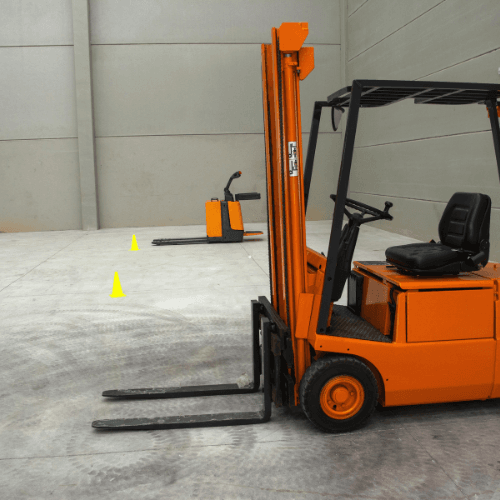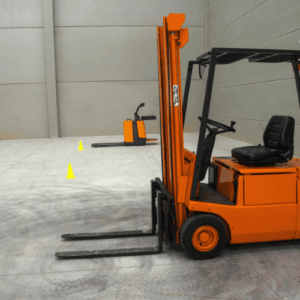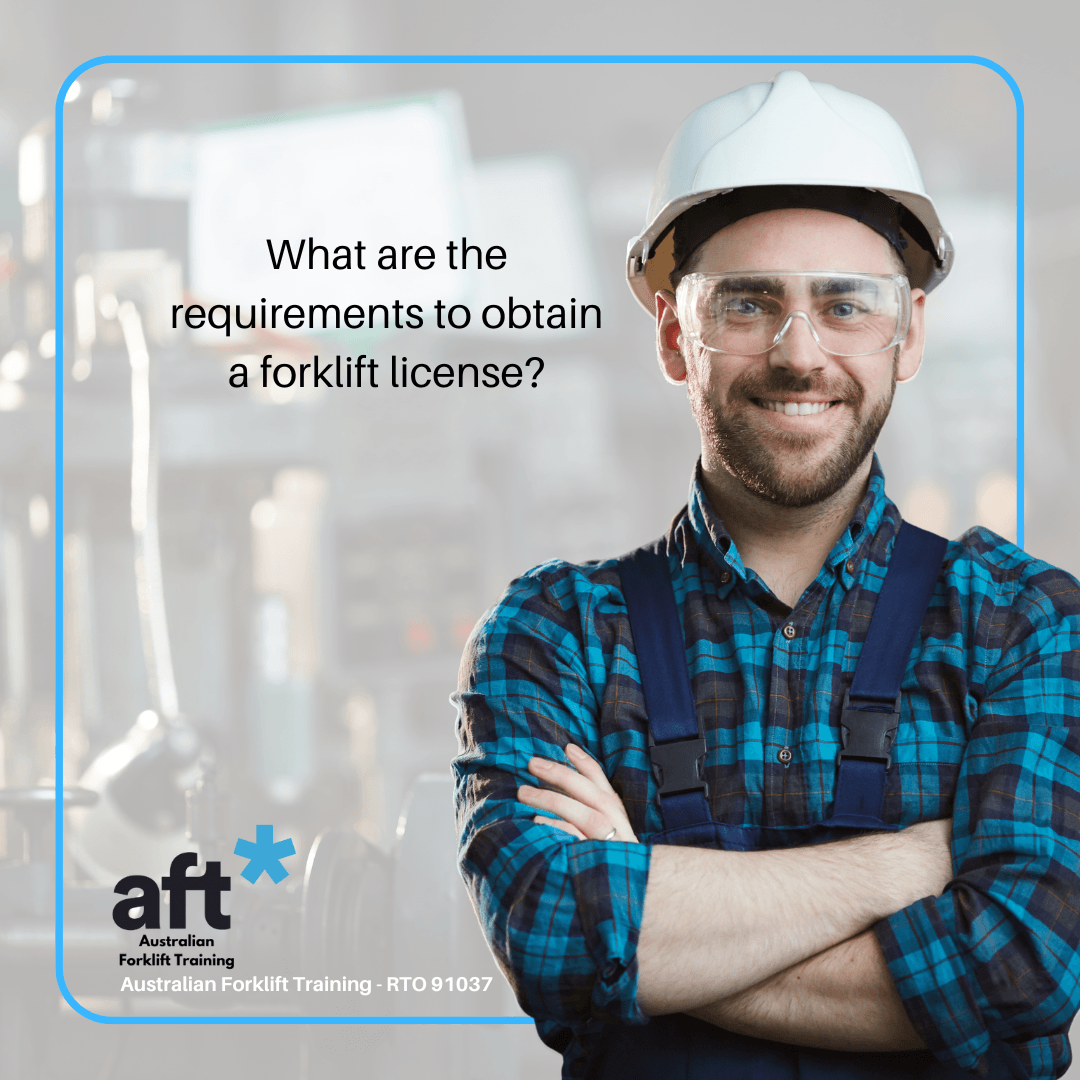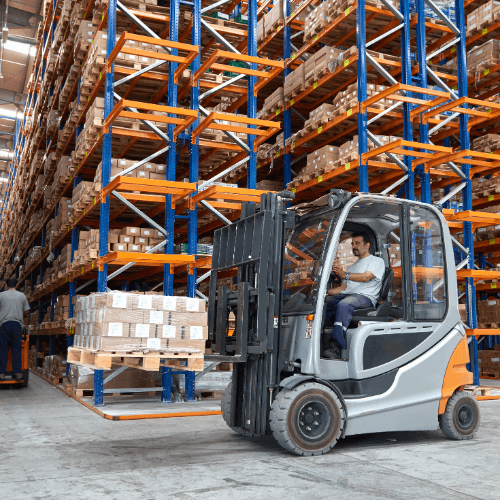
Forklift Training: Complete Guide to Getting Your License in 2025
Forklift Training: Complete Guide to Getting Your License in 2025
Over 900,000 Australians currently hold a high risk work licence with a forklift training component, making it one of the most sought-after certifications in the industrial workforce. With forklift-related injuries costing the economy an estimated $50 million annually, proper training has never been more critical for both safety and career advancement.
Whether you’re looking to enhance your employability, meet workplace compliance requirements, or start a new career in warehousing and logistics, obtaining your forklift licence opens doors to thousands of job opportunities across Australia. This comprehensive guide will walk you through everything you need to know about forklift training in 2025, from certification requirements to course costs and career prospects. It provides all the information you need to understand forklift training, including safety guidelines, operational techniques, and theory, ensuring you are fully informed before starting your training.
With this knowledge, you’ll be fully prepared to meet industry standards and contribute to a safer, more productive work environment. Participants can expect a great experience, with engaging instruction and a supportive learning environment throughout their forklift training journey.
We deliver training for the nationally recognised units:
TLILIC0003– Licence to operate a forklift truck
TLILIC0004– Licence to operate an order picking forklift truck

Introduction to Forklift Training
Forklift training is a crucial aspect of ensuring a safe and efficient workplace, especially in industries where the operation of forklift trucks is a daily necessity. As a registered training organisation, we are committed to delivering forklift licence courses that not only meet but exceed industry standards. Our training courses are designed to equip participants with the essential skills and knowledge required to operate a forklift truck safely and confidently, whether you are just starting out or are an experienced operator looking to refresh your expertise.
Each forklift licence course is structured to provide a comprehensive learning experience, combining theoretical knowledge with hands-on practical training. Beginners benefit from step-by-step instruction and supportive guidance, while experienced operators can enhance their existing skills and stay up to date with the latest safety protocols. By successfully completing our forklift training, participants gain the confidence and competency needed to operate a forklift truck in compliance with workplace safety regulations, ultimately obtaining a nationally recognized forklift licence. Our goal is to ensure every participant leaves our course fully prepared to meet industry standards and contribute to a safer, more productive work environment.
What is Forklift Training and How to Get Licensed
Forklift training is a structured education and assessment process designed to ensure individuals can operate a forklift truck safely and efficiently. Forklift truck training provides a comprehensive approach that covers both theoretical knowledge and practical skills, ensuring participants are fully prepared for licensing requirements. The core certification for operating a standard forklift is the TLILIC0003 Licence to Operate a Forklift Truck, which is mandated under national Work Health and Safety (WHS) regulations.
Minimum Requirements and Documentation
To qualify for forklift training and obtain your licence, you must:
- Be at least 18 years old (legal minimum for high risk work licence in Australia). Participants must be at least 18 years old to enroll in forklift training courses.
- Provide original, government-issued photo identification. Individuals seeking a forklift license must provide two forms of proof of ID, including one form of photo ID.
- Supply proof of address and visa documentation if not an Australian citizen
- Successfully complete a nationally recognized training course through a registered training organisation
Attendance at in-person practical assessments is mandatory, and in some cases, you may need to attend a different facility for your final SafeWork assessment.
The Certification Process
The pathway to obtaining your forklift licence involves several key steps:
- Complete Training: Enroll in an accredited forklift training course that covers both theoretical knowledge and practical skills
- Pass Assessments: Successfully complete written theory assessment and practical skills test on industry-standard equipment
- Receive Notice: Obtain a ‘Notice of Satisfactory Assessment’ from your training provider
- Apply for Licence: Submit your application to state/territory regulators (SafeWork NSW, etc.) within 60 days
- Pay Fees: Complete payment of license application fees (typically $75-$100 depending on state)
Upon successful attainment of your forklift licence, your qualification is formally recognized under the Australian Qualifications Framework.
We deliver training for the nationally recognised units:
TLILIC0003– Licence to operate a forklift truck
TLILIC0004– Licence to operate an order picking forklift truck
Types of Forklift Licenses Available
Australia recognizes several categories of forklift licenses, each designed for specific equipment and operational requirements:
| License Type | Code | Description |
|---|---|---|
| Standard Forklift (LF) | TLILIC0003 | Counterbalance and high-reach forklifts |
| Order Picker (LO) | TLILIC0004 | Machines where operator is elevated with load |
| Telescopic Handler | RIIHAN309F | Equipment with telescoping booms and multiple attachments; specific training and certification are required for machines with a boom length of 11 meters or more |
All forklift licenses are nationally portable, meaning they’re recognized across all Australian states and territories without requiring additional testing or certification.
Types of Forklift Training Courses Available
The variety of training courses available ensures there’s a perfect program to meet your specific needs and career goals, whether you’re a beginner or experienced operator looking to expand your skills.
Many providers also offer group training options, allowing businesses to book sessions for teams and customize safety training solutions to improve their emergency response capabilities.
Standard Forklift License Course (TLILIC0003)
This is the most commonly attended forklift licence course, typically delivered over 2-3 days for new entrants. The comprehensive curriculum covers:
- Legislative compliance and WHS obligations
- Operational theory and load capacity calculations
- Safe work practices and hazard identification
- Pre-use inspections and equipment maintenance
- Load handling techniques and stacking procedures
- Emergency response protocols
Training facilities are fully equipped with industry-standard vehicles and resources to ensure realistic, hands-on learning.
Training providers report pass rates of 80-92% for first-time test takers, with higher success rates correlated to small class sizes and comprehensive practical sessions. Certain forklift training courses can cost as low as $389 during promotional sales.
Book your forklift training at our Blacktown or Moorebank centre
Order Picker License Course (TLILIC0004)
Specifically designed for warehouse operations using stock pickers where operators work at elevated heights. The course also covers the safe operation of elevated work platforms and highlights the importance of competency and certification for such equipment to ensure compliance with industry standards and regulations. This course emphasizes:
- Fall prevention and safety harness usage
- Order picking strategies and efficiency techniques
- OH&S obligations for elevated work platform operations
- Specialized equipment inspection procedures
Combo Courses and Multi-Skill Packages
Many registered training organisations offer combined licensing packages that provide significant value:
- LF/LO Combo: Standard forklift and order picker licenses together
- 3-in-1 Telescopic Handler: Covers multiple attachments (forks, buckets, jibs)
- High Reach Specialization: Extended training for specialized warehouse racking environments
These combo packages are designed to reduce total training time and costs while maximizing employability across different industry sectors.
Can I Get a Forklift Licence Without a Job Offer?
Specialized Equipment Training
Beyond our standard forklift training course, we recognize that different industries and workplaces have unique requirements when it comes to materials handling. That’s why we offer a range of specialized equipment training courses tailored to the specific needs of our participants. Whether you need to operate high-reach forklifts, rough terrain forklifts, or electric and internal combustion models, our forklift training courses are designed to provide you with the skills and knowledge necessary to operate these machines safely and efficiently.
Each training course is developed to address the unique challenges and operational techniques associated with different types of forklifts and equipment. Participants learn not only how to operate forklifts, but also how to adapt their skills to various workplace environments and equipment specifications. Our experienced trainers ensure that every participant receives practical, hands-on instruction that builds confidence and competence, helping you meet your specific needs and achieve your career goals in the materials handling industry.
High-Reach Forklifts and Attachments
Our high-reach forklift training course is specifically designed for those who need to operate high-reach forklifts and their various attachments in warehouse and industrial settings. This forklift training course covers essential topics such as accurate load calculation, maintaining stability, and following strict safety procedures. Participants engage in practical assessment activities that simulate real-world scenarios, ensuring they can operate a forklift truck and its attachments with confidence and precision.
Upon successful completion of the course and practical assessment, participants are awarded the TLILIC0003 Licence to operate a forklift truck. This nationally recognized licence demonstrates your ability to operate high-reach forklifts safely and in accordance with industry standards. Our training ensures that every participant not only understands the theory behind safe operation but also develops the practical skills needed to handle equipment efficiently and safely in any workplace.
Forklift Training Options: Online vs Face-to-Face
Modern forklift training has evolved to offer flexible learning options that accommodate different schedules and learning preferences while maintaining the highest industry standards. These flexible options enable providers to effectively train students in both theoretical knowledge and practical forklift operation skills.
Flexible Online Theory Components
Many providers now offer online theoretical components that can be completed at your own pace. Forklift training courses offer a blend of online learning and on-site training opportunities. The online theoretical learning approach can be more enjoyable compared to traditional textbook learning. These digital modules cover:
- Legislative requirements and compliance frameworks
- Hazard recognition and risk assessment
- Safe operating principles and best practices
- Technical concepts and load calculations
Online theory allows students to study when convenient while ensuring consistent, standardized delivery of essential knowledge.
Mandatory Practical Training Sessions
All practical training and assessment must legally take place at approved facilities or client workplaces that meet safety standards. These hands-on sessions include:
- Equipment inspection and pre-operational checks
- Safe maneuvering in confined spaces
- Load management and stacking techniques
- Emergency response procedures
Practical assessments are conducted using industry-standard equipment with certified assessors observing all safety protocols and operational competencies. Students are trained to industry standards, ensuring they are well-prepared for real-world forklift operation.
Hybrid Training Models
Increasingly popular hybrid approaches combine the flexibility of online theory with comprehensive on-site practical training. This model offers:
- Reduced time away from work for theory components
- Intensive, focused practical sessions. Hands-on practical training is significant for applying knowledge learned through online courses.
- Cost-effective training delivery
- Improved retention through varied learning methods
Fast-Track Training Programs
For experienced operators or those with urgent training needs, accelerated pathways are available:
Express Training for Experienced Operators
Designed for individuals with prior machinery experience, these programs can reduce training time by up to 50% through:
- Shortened refresher sessions focusing on compliance updates
- Rapid skills assessment and competency verification
- Same-day certification for qualified candidates
2-Day Intensive Courses
Standard programs compressed into intensive schedules while maintaining comprehensive coverage of all required competencies. These courses feature:
- Extended daily training hours
- Concentrated practical sessions
- Immediate assessment and certification
Course Costs and Current Promotions
Understanding the investment required for forklift training helps you make informed decisions about your professional development and budget planning.
Standard Pricing Structure
Current market rates for forklift training in 2025 reflect the comprehensive nature of certification programs:
- Single License (LF or LO): $295-$595 including assessment and materials
- Combo Packages: From $600 (reduced from $750) for significant savings
- Verification of Competency: $125+gst for existing license holders
Money-Saving Opportunities
Training providers regularly offer promotional pricing to make certification more accessible:
- Winter/EOFY Sales: 20-40% discounts on selected courses. Discounts for forklift training courses can reach up to 40% during special events like EOFY sales.
- Group Bookings: Reduced per-person rates for corporate training
- Payment Plans: Flexible financing options for individual students
- Package Deals: Multi-license combinations at reduced total cost
Be aware that some providers may advertise low prices but include hidden fees for materials, assessment, or license application assistance. Always confirm the total cost before enrollment. The cost for re-assessment in forklift training is generally not included in the primary course fee.
Additional Costs to Consider
Beyond course fees, budget for:
- State license application fees ($75-$100)
- Photo fees (if required by your state)
- Travel costs to training locations
- Potential retesting fees (though many providers offer unlimited free retests)
Training Locations Across Australia
Access to quality forklift training is available nationwide, with facilities strategically located to serve both urban and regional communities.
Forklift Training Centers
Sydney: Primary training center in Blacktown and Moorebank with satellite locations serving the greater metropolitan area
Regional and Remote Training Options
Recognizing the need for accessible training across Australia’s vast geography:
- Tasmania: Dedicated centers in George Town and Sorell
- Northern Territory: Darwin-based training with mobile trainer options
- ACT: Specialized programs for government and defense sector requirements
- Regional Queensland: Pop-up training sessions in mining and agricultural centers
Many providers offer onsite training for businesses with sufficient numbers of trainees, bringing certified trainers and equipment directly to your workplace.
What’s Included in Forklift Training
Comprehensive forklift training encompasses both theoretical knowledge and practical skills to ensure graduates can work safely and effectively in real-world environments. As part of our commitment to service, we provide comprehensive support throughout the training process, ensuring students receive the assistance they need at every stage.
Theoretical Foundation
The theory component provides essential knowledge including:
- Physics of Operation: Center of gravity principles, stability triangle concepts, and load capacity calculations
- Legislative Framework: WHS Act requirements, duty of care obligations, and workplace safety protocols
- Hazard Management: Risk identification, assessment procedures, and mitigation strategies
- Equipment Knowledge: Understanding different forklift types, capabilities, and limitations
Practical Skills Development
Hands-on training covers critical operational competencies: Trainers teach both foundational and advanced practical skills to ensure participants are confident and competent in forklift operation.
- Pre-Operational Inspections: Daily safety checks including tire condition, fluid levels, mast integrity, and hydraulic systems
- Safe Operation: Starting procedures, maneuvering techniques, load handling, and proper shutdown protocols
- Advanced Techniques: Operating on gradients, confined space navigation, and emergency procedures
- Load Management: Proper stacking methods, weight distribution, and recognizing unsuitable loads
Assessment and Certification Process
Both written and practical assessments ensure competency:
- Theory Test: Multiple choice and short answer questions covering all knowledge areas
- Practical Assessment: Hands-on demonstration observed by certified assessors using industry-standard equipment
- Continuous Assessment: Ongoing evaluation throughout the training program
Safety Focus and Best Practices
Modern forklift training emphasizes safety culture beyond mere compliance:
- Scenario-Based Learning: Real-world situations including obstructed views, mixed-traffic environments, and complex racking systems
- Emergency Response: Protocols for accidents, near-misses, and equipment failures
- Proactive Safety: Encouraging hazard reporting and continuous improvement mindsets
It is essential to maintain high safety standards and compliance through ongoing training and support.
Training materials are provided free of charge and typically include comprehensive handbooks, practice questions, and ongoing support resources.
Verification of Competency (VOC) Training
For existing license holders, Verification of Competency training provides essential skills verification and refresher education without requiring complete retraining.
When VOC Training is Required
Many employers mandate VOC assessments for:
- New employee onboarding
- Annual competency verification
- Return-to-work after extended absence
- Compliance audits and insurance requirements
- Skills verification for specific workplace environments
VOC Process and Benefits
The streamlined VOC process includes:
- Skills Assessment: Evaluation of current competencies against industry standards
- Refresher Training: Updates on legislative changes and best practices
- Workplace-Specific Training: Customization for particular environments and equipment
- Certification: Documentation of current competency for employer records
Corporate VOC programs can be delivered on-site, incorporating workplace-specific hazards and procedures while maintaining national training standards.
Support Services and Student Assistance
Quality training providers understand that students have diverse backgrounds and learning needs, offering comprehensive support to ensure everyone can succeed. Dedicated staff are available to assist students with language, literacy, and numeracy needs, as well as provide guidance throughout the training process.
Student Support Infrastructure
Dedicated Student Support Officers provide assistance with:
- Language and Literacy: Support for students with English as a second language
- Learning Difficulties: Alternative assessment methods and additional coaching
- Cultural Sensitivity: Bilingual trainers and culturally appropriate training methods
- Technical Support: Help with online learning platforms and digital resources
Flexible Learning Options
To accommodate diverse student needs:
- Small Class Sizes: Typically capped at 6-8 students for personalized attention
- Unlimited Retesting: Many providers offer free retesting for students who need additional attempts
- Flexible Scheduling: Multiple course start dates and timing options
- Individual Coaching: One-on-one support for students requiring additional assistance
Quality Instruction
Training is delivered by experienced professionals who combine:
- Industry Experience: Trainers with extensive forklift operation backgrounds
- Teaching Qualifications: Current TAE40116 credentials or higher
- Ongoing Development: Regular updates on equipment changes and regulatory updates
- Safety Focus: Emphasis on developing safety-conscious operators
Career Opportunities After Forklift Training
Obtaining your forklift licence opens doors to diverse career opportunities across multiple industries with strong growth prospects and competitive compensation. Graduates leave the training feeling confident in their ability to operate forklifts safely and efficiently.
Immediate Employment Opportunities
The forklift qualification addresses significant skills shortages across key sectors:
- Warehousing and Distribution: E-commerce growth drives continuous demand for skilled operators
- Manufacturing: Production facilities require licensed operators for material handling
- Construction: Building sites need operators for material movement and equipment handling
- Mining and Resources: Remote operations offer premium wages for qualified operators
- Retail and Logistics: Supply chain operations across all retail sectors
Career Progression Pathways
Starting as a forklift operator provides foundation for advancement:
- Team Leader/Supervisor: Leading warehouse teams and training new operators
- Safety Officer: Specializing in workplace safety and compliance management
- Trainer/Assessor: Teaching forklift operation with additional training qualifications
- Operations Manager: Managing entire warehouse or distribution operations
- Equipment Specialist: Maintaining and servicing materials handling equipment
Salary Expectations and Growth
Forklift operators enjoy competitive compensation with growth potential:
- Entry Level: $45,000-$55,000 annually for new operators
- Experienced Operators: $55,000-$70,000 with additional skills and experience
- Specialized Roles: $70,000-$80,000+ for supervisory or specialized equipment operation
- Regional/Remote Work: Premium rates often 20-40% above metropolitan averages
National Mobility Advantage
The nationally portable forklift licence provides unique career flexibility:
- Interstate Opportunities: Work anywhere in Australia without additional certification
- Seasonal Work: Follow seasonal industries like agriculture and mining
- Project-Based Employment: Construction and infrastructure projects across the country
- Career Flexibility: Easy relocation for family or lifestyle reasons
Getting Started with Your Forklift Training Journey
Taking the first step toward forklift certification is straightforward when you understand the process and have the right information to make informed decisions.
Choosing the Right Training Provider
When selecting a registered training organisation, consider:
- Accreditation Status: Ensure the provider is properly registered and accredited
- Location Convenience: Training centers accessible to your location
- Course Scheduling: Timing that fits your work and personal commitments
- Support Services: Available assistance for your specific learning needs
- Industry Reputation: Provider track record and student success rates
Preparing for Training Success
Maximize your training investment by:
- Understanding Requirements: Familiarize yourself with course expectations and assessment criteria
- Gathering Documentation: Prepare required identification and supporting documents in advance
- Physical Preparation: Ensure you’re physically capable of operating industrial equipment safely
- Mental Preparation: Approach training with a safety-first mindset and willingness to learn
Next Steps and Enrollment
Ready to begin your forklift training? Here’s how to proceed:
- Research Training Options: Compare course types, schedules, and pricing from multiple providers
- Contact Training Providers: Discuss your specific needs and circumstances with student advisors
- Confirm Enrollment Details: Verify all costs, inclusions, and hidden fees before committing
- Schedule Your Training: Book your preferred dates and complete any pre-course requirements
- Prepare for Success: Gather required documents and prepare mentally for your new career opportunity
How much do forklift drivers get paid in NSW? Complete 2025 Salary Guide
Forklift training represents more than just obtaining a licence—it’s an investment in your future career security and growth potential. Comprehensive courses can effectively blend online and on-site training to cater to diverse learning needs. With proper training from a quality registered training organisation, you’ll gain the skills, knowledge, and confidence needed to operate a forklift truck safely while opening doors to rewarding employment opportunities across Australia.
The combination of strong industry demand, competitive wages, and career advancement potential makes forklift certification one of the most valuable investments you can make in your professional development. Whether you’re entering the workforce for the first time, changing careers, or enhancing your existing skills, forklift training provides a solid foundation for long-term career success.
Take the first step today by contacting accredited training providers in your area to discuss course options that meet your specific needs and schedule requirements. Utilizing technology such as online platforms enhances the learning experience by allowing convenient access to resources. Your future career in Australia’s growing logistics and manufacturing sectors is just one training course away.


